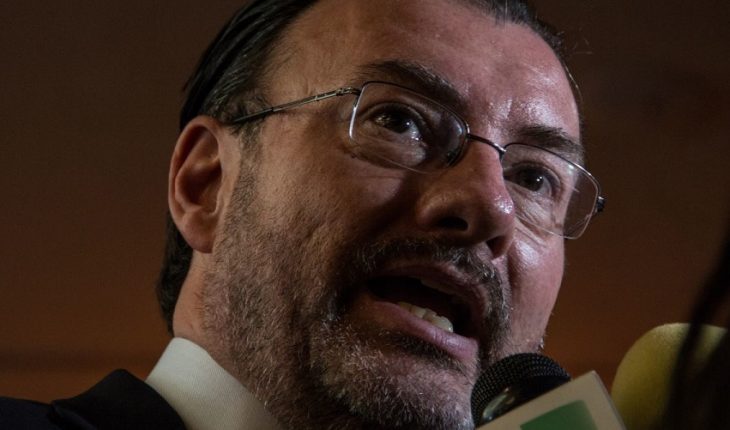Former Treasury Secretary Luis Videgaray ordered the diversion of public resources from a dozen federal units through the mechanism known as The Master Scam for the financing of political campaigns, vote buying and promotion of the government of Enrique Peña Nieto and his party, the PRI, declared Emilio Zebadúa, major exoficial of Sedesol and Sedatu, to the Attorney General’s Office of the Republic (FGR).
To obtain legal pardon in the investigation into the possible diversion of public resources, Zebadúa made an 18-page ministerial statement, which chronicles the modus operandi of The Master Scam, from which he desired any involvement, although he was legally seized from bank accounts and in charge of managing the budget of both units.
Find out: Bribery, washing and organized crime, the crimes that can be charged to EPN and Videgaray in case of bribes
And even though the Financial Intelligence Unit (UIF) detected expenses of 205 million pesos along with two of his brothers, without corresponding to his income, so they were denounced for likely money laundering.
Animal Politics obtained the ministerial appearance held on 19 October last as part of the criminal case FED/SEIDF/UNAI-CHIS/0001522/2018, where Zebadúa assured that the holder of the Treasury in the past six years allocated extra resources to the units that would apply the diversion scheme.
“Secretary Rosario Robles told me that in consultation with Secretary Videgaray she had proposed to him to hire private companies that would provide services inherent in the campaign of the National Crusade against Hunger, through the use of Public Universities, since the Procurement Act allowed it and at the same time made it easier to decide suppliers a priori.”
This allowed the start of the mechanism in Sedesol, but also in a dozen other units, such as Sagarpa, Economía, SCT, ISSSTE, Pemex, among others, which were given “extraordinary resources by the Ministry of Finance to provide permanent resources during the six-year period for the advertising, political-electoral promotion of the president, his government and his political party, without previously having formally budgeted programs for them. It also diverted public resources for political campaign financing,” Zebadúa said.
What he describes is the mechanism revealed in the journalistic investigation The Master Scam in September 2017 by which 11 government units delivered, between 2013 and 2014 alone, more than 7 billion pesos to eight public universities to make alleged services, but they outsourced to companies that turned out to be illegal or ghost and, therefore, the money disappeared.
Although it was a complex mechanism involving hundreds of people as secretaries of state, senior officials, rectors and so-called entrepreneurs, so far only Rosario Robles is in pre-trial detention for allegedly a risk of escape in the judicial process it faces for misuse of powers; in addition, there is an apprehension order against 11 more people, but no senior official.
This is the first time that former Tax owner Luis Videgaray has been involved in a court statement; and this is a key piece, as the reliance on him allowed the delivery of resources to each unit for agreements with universities, although the Federation’s Higher Audit warned of an alleged diversion since 2014.
In fact, this scheme began on par with the government of Enrique Peña Nieto, Zebadúa said. Since 2012, “a general strategy, both social and political electoral, would be launched involving most government units, one of which was the National Crusade against Hunger, which diverted un budgeted public resources for brigadeo, media and social organization campaigns in strategic municipalities, as well as proselytizing acts or vote buying.”
“Secretary Robles also told me that Luis Videgaray presented him with the need to channel Resources from Sedesol to pay debts for the presidential election campaign that he had coordinated for President Enrique Peña Nieto,” Zebadúa told the PGR.
Zebadúa on the sidelines?
Emilio Zebadúa recounts an alleged conversation with her then-boss, Rosario Robles, in early 2014, when she asked her to accompany her to a meeting with Treasury Secretary Luis Videgaray at her alternate office on Julio Verne Street in Polanco.
“In that appointment both secretaries were interviewed privately, I waiting for them in an adjoining boardroom. On leaving and transiting back to Sedesol, Secretary Robles told me that by instructions Dr. Videgaray owed one of the undersecretariats of Sedesol, in particular that in charge of Javier Guerrero García, to hire one or more companies in order to cover a campaign commitment of about one billion pesos owed to the owners”.
Javier Guerrero, effectively signed collaboration agreements with universities, but it was even since 2013 with the Technological of the Hidalguense Huasteca, the Aguascalientes Technology; or the Baja California Sur Autonomous in 2015; in all cases they were less than 3 million pesos for the “service” of creating community committees as part of the National Crusade against Hunger, although none were marked by any irregularity by the Federation’s Superior Audit.
Instead, Emilio Zebadúa signed the first agreements that were not only pointed out by the Audit, but were criminally denounced for the possible commission of crimes.
On 1 March 2013 and 6 May 2013, Zebadúa, as senior officer of Sedesol, signed two general agreements with the autonomous universities of the State of Mexico and Morelos, respectively.
These documents, obtained by Animal Politics via transparency, were the starting point for the realization of seven specific agreements with both universities to make supposed services for the Crusade such as the distribution of half a million pantries, the organization of a concert or the purchase of shirts and caps for brigadiers for 881 million pesos, and which were presumably diverted , as reported by the Federation’s Higher Audit.
According to Zebadúa’s statement, Secretary Robles “directly ordered her subordinates, officials responsible for administrative processes and payment arrangements such as the Directorate-General for Programming and Budgeting, Financial Resources Directorate, Budget Exercise Directorate, Accounting Directorate, Directorate of Budget Control of Entities, Treasury Directorate and Budget Sub-Direction, make payments , in accordance with the provisions of the agreements concluded”.
But according to the internal regulations of the Sedatu in force last six years, all the posts mentioned depended not on the owner Robles, but on Emilio Zebadúa, since they were part of the Senior Officer, led by him.
This is the immediate underling of Zebadúa in both Sedesol and Sedatu, Francisco Báez Alvarez, Director General of Programming and Budgeting, who faced criminal indictment for the alleged diversion of 185 million having authorized the payment of an agreement with the Universidad Politécnica Francisco I. Madero de Hidalgo, but was not even linked to the process, that is, the judicial process was discarded.
Martha Lidia Montoya Santos, Director of Treasury, who depended on the Directorate of Programming and Budgeting, also authorized the procedures for the exit of appeals to the Ministry of Finance.
In fact, in the Secretariat of the Civil Service (SFP) it maintains an open investigation against 25 former Sedatu officials, including those in the Senior Officer’s Office and, according to the unit, that area allowed the diversion of more than 4 billion pesos.
Zebadúa states that Robles promoted the signing of agreements with universities in Sedesol through various areas such as the general direction of Social Communication, then directed by Rocío Bolaños, Ramón Sosamontes and Gustavo Rodríguez; as well as the general management of Geostatistics and Beneficiary Padrones, by José Antolino Orozco Martínez and under the Undersecretary of Community Development, Javier Guerrero; and María de la Luz Vargas, Director of Communication at Sedatu.
According to Zebadúa, Robles told him that “she herself constantly met with all these people in the Ph of Sedesol and established mechanisms, designed legal strategies and determined the companies to be used in procurement schemes. These meetings were held weekly. She and her close ones established the modus operandi of the Master Scam.”
Although Ramón Sosamontes and Gustavo Rodríguez did sign agreements in Sedatu, Zebadúa did not mention in his statement the other officials who also signed agreements at Sedesol and who depended hierarchically on him, such as Humberto René Islas Cortés, then General Manager of Material Resources and General Services, who signed seven agreements with different universities in Sedesol and Sedatu, and was criminally denounced by the Audit.
The subaltern of Islands, Enrique Prado Ordoñez, director of acquisitions and contracts at Sedesol, also signed with the Autonomous University of the State of Morelos in May 2013, iguto which Sonia Angélica Zaragoza, Director General of Human Resources; and Wendy Gabriela Arrieta Camacho, DIRECTOR of Information Technologies, the latter direct dependents of the senior officer.
Nor did he mention Juan Carlos Lastiri Quirós, Undersecretary of Prospective, Planning, Evaluation and Regional Development at Sedesol, who led the signing of one of the most onerous agreements, for 338 million pesos, investigated by the Audit and which led to the first criminal complaint filed by that body in October 2015.
In fact, all of the above are part of the team of twelve officials who held the same positions in both units and signed agreements that were reported to the PGR by the Audit.
The ones he does mention in the statement is the former undersecretary of Territorial Planning, Enrique González Tiburcio, and his sub-sternum, Armando Saldaña, director general of Territorial Planning in the Sedatu. Both denounced before the Internal Control Body and the PGR the forgery of their signature in two agreements with the Polytechnic University Francisco I. Madero de Hidalgo for 185 million pesos.
According to Zebadúa, even with the repeated signs of the Audit for this form of procurement, from 2012 to 2018, on the possible economic impact of both units reported to Rosario Robles, “this did not inhibit it from giving orders regarding the holding of such legal acts, nor did it motivat it to fully train the scope and risks of such recruitment policy to the holder of the Executive and other responsible officials”.
The latter is a central point in the criminal proceedings facing Robles, as it pays the prosecution of the Public Prosecutor’s Office, which contends that it did not prevent the mechanism despite being aware of the Audit’s observations.
In addition, she contradicts a statement by Robles at her second hearing, where she assured that she did inform President Peña Nieto of the alleged irregularities in those agreements identified by the Audit through three ways: cabinet meetings, red telephone and work tours.
That’s how resources came out from the Treasury
According to Zebadúa’s statement, the Ministry of Finance provided “extraordinary resources” to the units that would execute the Master Scam.
In order for this to be realized, a procedure involving finance officials and the Senior Officer of each unit was required, as set out in the Government Accounting Act.
Each change, request for extension and exercise of resources must be recorded in the Accounting and Budget System (SICOP), and in order to do so, user and key are required. According to sources of the past administration, the only ones who had access to that system in the Sedatu were the officials of the Senior Officer.com.
In this case, Francisco Báez, Director General of Programming and Budgeting, reviewed the budget expansion process in the unit and sent it for consideration to the Policy and Budget Control Unit of Finance, then by Isaac Gamboa, killed in Morelos last May, and to whom the Chihuahua Prosecutor’s Office pointed out for the possible diversion of resources of the Chihuahua government towards the campaigns of the PRI , along with former party secretary general Alejandro Gutierrez.
This request for enlargement was in turn sent to the undersecretariat of Egress of Finance, a post occupied by Alejandro Sibaja Ríos, direct underalterno of Videgaray. If approved, authorization to the Federation Treasury to make resources available to the SICOP of the Sedatu took turns.
While to execute the payment to suppliers, in this case the public universities, the procedure began with the management by Francisco Báez, who recorded the budget commitment in the Accounting and Budget System (SICOP) with the contract data, the supplier, expense item, budget program.
The Treasury of sedatu, headed by Martha Lidia Montoya, received the folio of the budget commitment and authorized the procedure in the SICOP, which was then registered in the Integral Financial Management System (SIAFF).
It was then required to process a Certified Settlement Account (CLC), that is, the verification document to record any erogation of the Federation’s Egress Budget.
Finally, the Federation Treasury reviewed, authorized and released the resources to pay the supplier and generates an authorized CLC, with it, the payment is made to the relevant supplier, in this case to the universities.
ClC
Pdf file (18 KB)
What we do at Animal Politics requires professional journalists, teamwork, dialogue with readers and something very important: independence. You can help us keep going. Be part of the team.
Subscribe to Political Animal, receive benefits and support free journalism.
#YoSoyAnimalEl Videgaray charge in sight: Zebadúa accuses him of ordering The Master Scam to help Peña appeared first in Political Animal.





